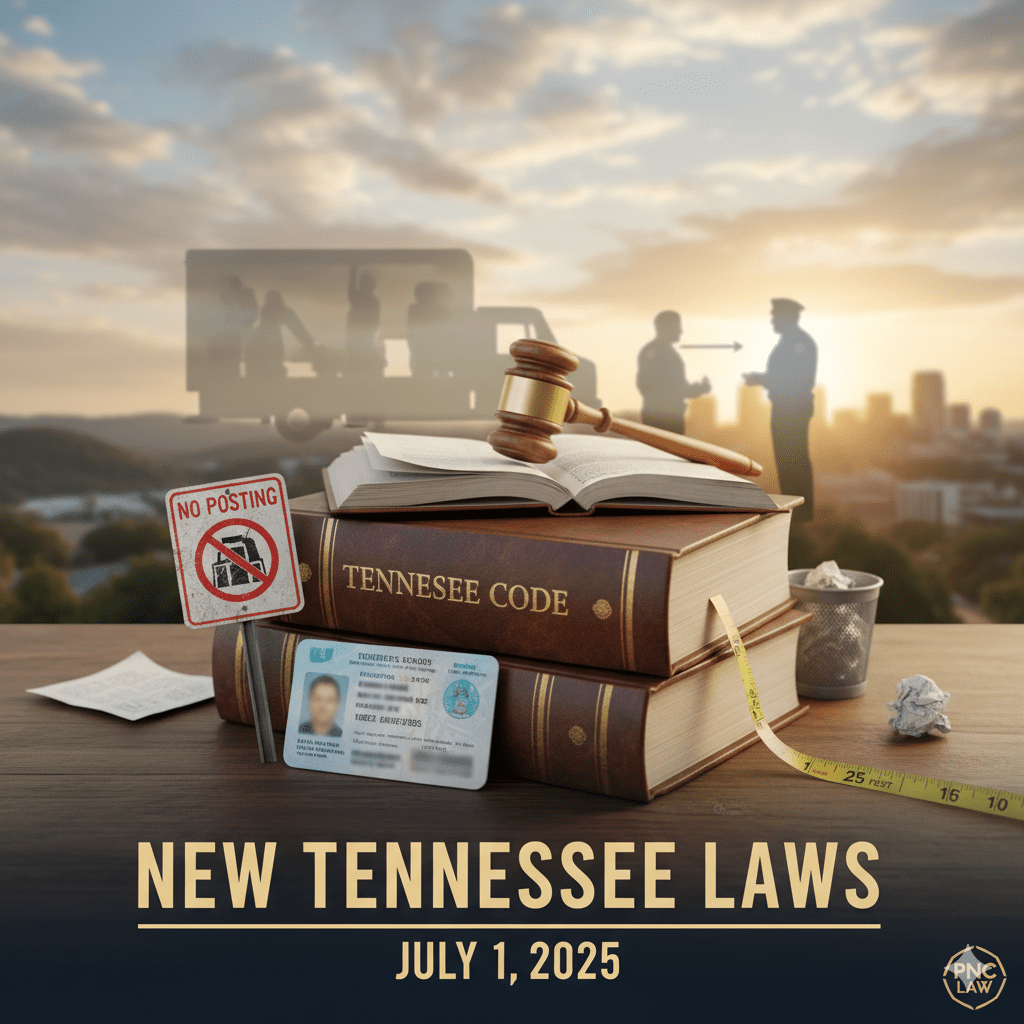The Tennessee legislature has been busy this summer, with multiple new laws that went into effect on July 1, 2025. Many of those were either new offenses or expansions of already existing ones, including several misdemeanor charges. Under HB 55/SB 30, you could now face a misdemeanor charge for putting up a poster on the highway, for giving a fake name to police if you’re being arrested, and approaching within 25 feet of police during an arrest.
Below is a quick-and-dirty summary of the misdemeanor charges passed by the Tennessee legislature that are now in effect statewide.
Approaching a Law Enforcement Officer
Under this new law, you could be arrested for a Class B misdemeanor if you get within 25 feet of an officer actively doing something related to law enforcement – like arresting someone. Law enforcement must be lawfully performing in their duties and must instruct others to stand back for the 25-foot restriction to be applied. Traffic stops, active investigation of an alleged crime, and dealing with an immediate threat to public safety are such duties under this offense.
When enacting this law, the Tennessee legislature spoke repeatedly about the George Floyd situation from 2020 and made it clear that this law is not intended to prevent the public from being able to video police conduct. It does not make it illegal to film or otherwise interact with police from that 25-foot distance. The Tennessee Senate also made it clear that this law does not seek to protect illegal police conduct and emphasized that police must be engaged in lawful conduct to invoke the 25-foot restriction.
False Name to Law Enforcement
This new law creates a Class C misdemeanor charge for intentionally giving police a fake name when they have arrested or otherwise detained someone. In its original form, this law would have also made it a crime to refuse to give law enforcement your name if you’re being detained or arrested, but it was amended before being adopted to apply only if you intentionally say your name is something other than your legal name during detainment.
If a law enforcement officer asks you for identification, you do not have to give it. But under this law, if you do, you must give your real name (the name that would be on your driver’s license) or risk a misdemeanor charge.
Arrests, Instead of Citations, for Misdemeanors
A police or peace officer can now make an arrest without a warrant for a misdemeanor not committed in the officer’s sight. The law requires that the officer give the reason why they decided to arrest someone, rather than issue a citation, for a misdemeanor. Officers can also now make arrests based on video evidence of someone committing a misdemeanor. Previously, officers had to see the crime being committed with their own eyes to arrest someone for a misdemeanor, but they can now arrest after being shown a video.
Additionally, an officer who, based on facts reasonably known or reasonably believed to exist, arrests a person for a misdemeanor instead of giving a citation also has civil and criminal immunity from false arrest, false imprisonment, or unlawful detention.
Signs and Posters on the Highway
It is now a Class B misdemeanor to put up a sign, poster, signal, or any other type of markings on highway structures without proper permission. This means that, without written permission from TDOT or whatever other transportation entity that’s responsible for that roadway, you cannot hang signs or banners from any sort of structure on the highway. That includes tunnels, bridges, and overpasses over interstates or other roadways.
Civil Rights Intimidation
Under the previous law, a person could be arrested for intimidating others while exercising civil rights for certain behaviors. Injuring, threatening to injure, or coercing someone with the intent to stop them from exercising a civil right protected by the laws and constitution of either Tennessee or the United States carried a Class D felony charge. Additionally, one could be charged with a felony for damaging, destroying, or defacing any property with the same intent to intimidate.
The new law adds another type of conduct that would be considered illegal for civil rights intimidation – littering or trespassing on someone else’s property “with the intent to unlawfully intimidate another because that other exercised any right or privilege” that is protected by state and federal laws and constitutions. The law defines littering as when someone “places, drops, or throws garbage, refuse, rubbish, unsolicited flyers, or other waste material on any public or private property without permission.” Of course, littering is already illegal, but it is now considered to be unlawful intimidation for someone to throw trash into your yard or on your car with the purpose of scaring you from exercising a protected civil right.
Unlike the other types of conduct, littering or trespassing with the intent to intimidate is a Class A misdemeanor, not a felony.
Transporting a Person in a Box Truck
This new offense makes it a Class B misdemeanor to transport people in the cargo area of a box truck. This law was created with protests and demonstrations in mind, where multiple people were transported to a march or other event by way of box trucks, like U-Hauls. Now, it is unlawful for people to be driven around in the cargo hold of a box truck due to its lack of seats, seatbelts, or other safety measures.
Facing a Criminal Charge? Let Us Help
If you’ve been arrested for a misdemeanor, the steps you take right now can make all the difference in protecting your future – and your wallet. Don’t face the criminal justice system alone. The experienced attorneys at PNC Law are ready to fight for your rights, minimize the consequences, and guide you through every stage of the process. Contact PNC Law today at (615) 785-2000 or philip@tncriminaldefenseattorney.com.

